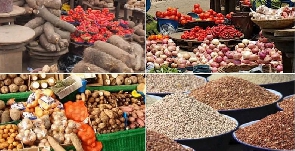 Agricultural and allied experts yesterday raised another red alert on food insecurity in East Africa
Agricultural and allied experts yesterday raised another red alert on food insecurity in East Africa
Agricultural and allied experts yesterday raised another red alert on food insecurity in East Africa, largely blamed on climate change.
They have called for urgent interventions to address the crisis, noting that 63 percent of the bloc’s population is undernourished.
“The impact of climate change is visible everywhere in the region. We should tackle it from the underlying causes”, warned Jean Baptiste Havugimana, the Productive Sector director at the East African Community (EAC) secretariat.
He said that despite last-minute rains during the last farming season, he was still worried that there would be sufficient rains during the coming season.
Mr Havugimana challenged governments and other stakeholders in the EAC partner states to waste no time in tackling the underlying causes of the crisis.
He raised the alert here before a group of cyclists moving across the region to raise awareness of the impact of climate change at the Arusha Technical College (ATC).
A programme manager with GIZ, a German aid agency, Max Middeke, said the situation was worrying because more than half of the bloc’s population (63 percent) was food insecure.
“In East Africa, climate change is causing devastating impacts on food security, leading to harvest failure and livestock losses,” he pointed out.
He implored the regional leaders to act swiftly to help manage the adverse impacts of climate change “and reduce the threat of food insecurity.”
In the EAC, Mr Middeke went on to say, the situation has reached a point where livelihoods have been threatened due to the severity of climate change impacts.
Besides climate adversity, other reasons that are associated with increasing food insecurity in East Africa include violent conflicts and the global economic environment.
He added that GIZ would continue to support non-state actors in policy advocacy that promotes environmental sustainability and improves climate change adaptation.
One of the programmes, the EAC-GIZ SEAMPEC II, supports youth and women-focused activities that foster their involvement and engagement in the EAC Climate Change narrative.
This year’s theme for the Great African Cyclists Safaris (GACs) is promoting people-centred integration through awareness creation on climate change and food security.
Ms Jennifer Gathie, an EAC secretariat official in the agricultural production sector, said it was a pity that the region was still so dependent on rain-fed agriculture.
She said the climatic conditions in some areas of the EA region had become so “’extremely volatile” that irrigation was no longer a luxury but a necessity.
“The solution to the climate change crisis lies with irrigation systems, rainwater harvesting, and climate-smart agriculture,” she said.
ATC Rector Dr Musa Chacha said human-induced activities rather than natural forces were to blame for climate change, a phenomenon associated with global warming.
He said it should not surprise anybody that the college, which trains engineers and technicians, is a partner that agitates for food security.
This, according to him, was primarily because the training institution (ATC) was promoting renewable energies that safeguard the environment.
Failure to mitigate the effects of climate change was also cited by a regional business body as one of the reasons why agricultural production remains low in East Africa.
The East African Business Council (EABC), in its report released last month, said the climate change factor cannot be overlooked as it has led to droughts and declining soil fertility.
The same concerns were raised by the Eastern and Southern Africa Small Scale Farmers’ Forum (Esaff) in June this year, which cited natural calamities and conflicts as among the factors behind the food crisis in the region this year.
The conflict-torn DR Congo (DRC) is leading the pack, with about 25 million facing food scarcity, the Morogoro-based lobby said in a report.
South Sudan, which has not fully recovered from years of civil war, has 7.7 million people at risk of not having enough food.
The alarming statistics on the looming food crisis in the region were made public during a discussion organized by Esaff on food security.
The situation was equally alarming in Kenya, the region’s largest economy, which has been subjected to a prolonged drought that has severely impacted agriculture and livestock.